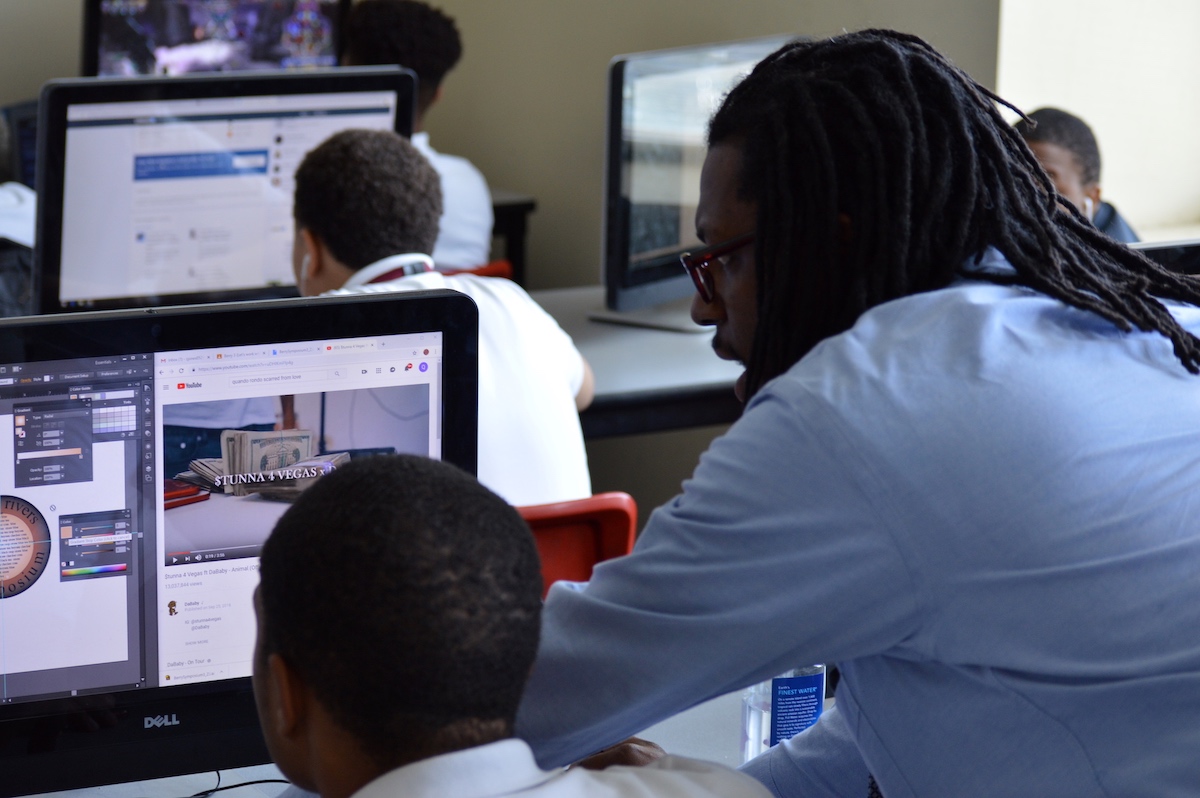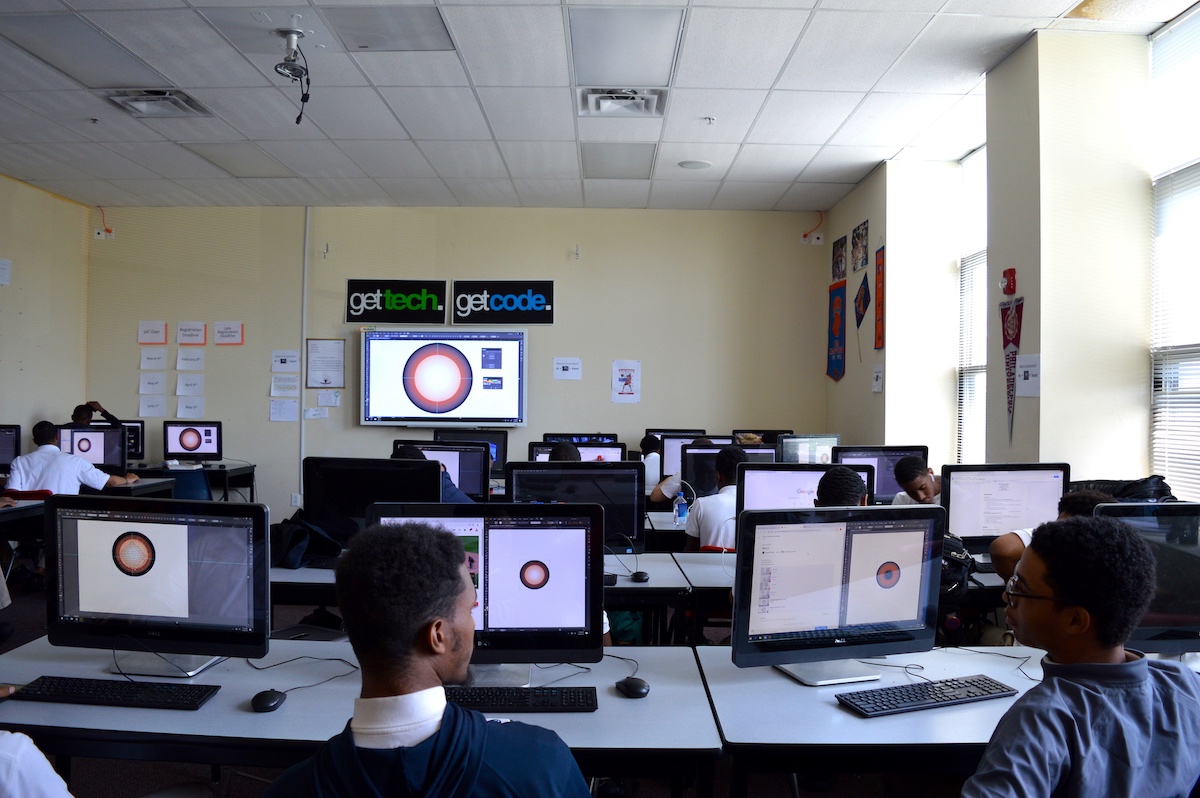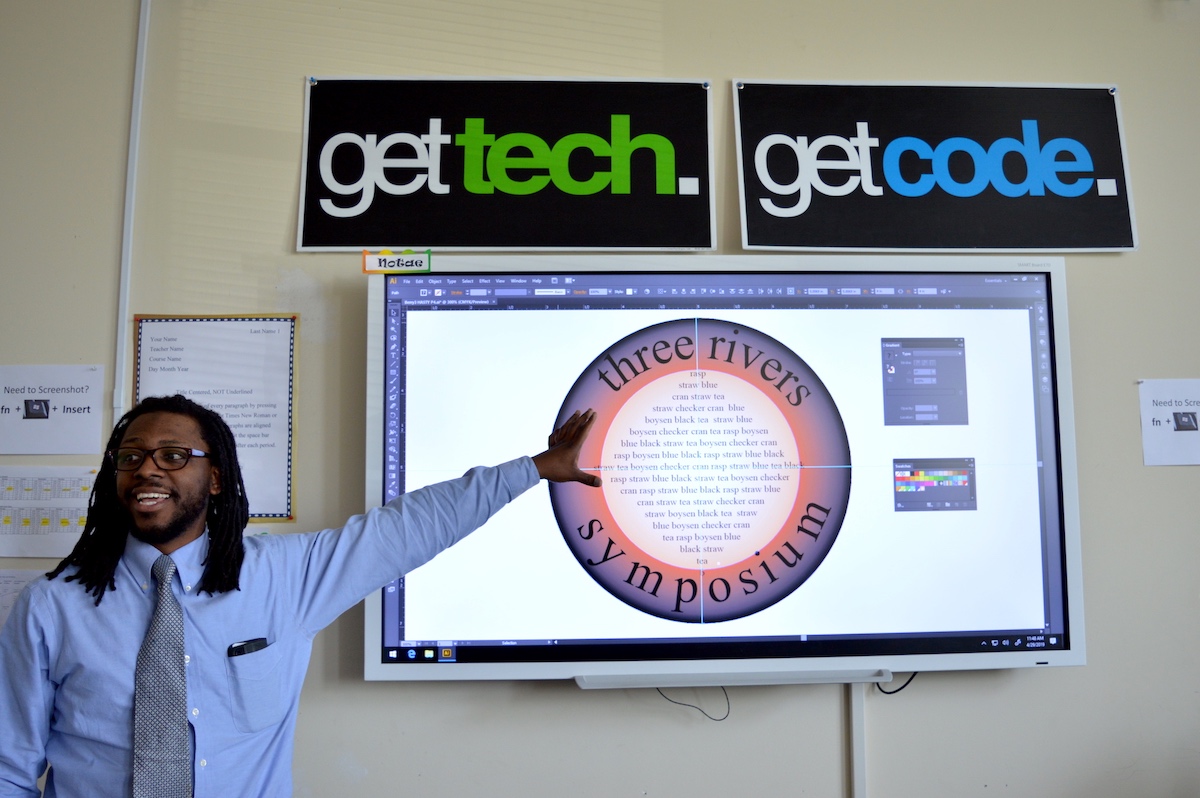Desmond Hasty won’t admit it, but every day inside his computer science classroom at Boys’ Latin of Philadelphia Charter School is a struggle.
Each day, Hasty stands in front of each child, no fewer than 15 per class, and tries to teach them one part of a STEM education that could prepare them for the rest of their lives. Some listen, some would rather sit in the cut and play Fortnite or watch YouTube videos.
It’s a thankless job at a city charter school.
On this particular day, Hasty, the school’s lone computer science teacher and robotics club coach, tries to teach a class of about 22 students the importance of the snipping tool in Adobe Illustrator. Half the class is listening, apparent by Hasty needing to stop every 15 to 20 seconds to explain what he just said in front of the whiteboard to a confused student.
It’s a grind, but with a smile, Hasty dutifully walks over each time and offers a personal explanation.
“Sure, kids check out and so there’s a constant struggle,” Hasty affirmed. “But at the end of the day, I just have to think of new ways to reinvent myself to teach these important life skills. There’s just this immediate need for knowledge and instant gratification nowadays that if they don’t get it off the bat, it’s a number’s game for who’s going to put in the work to comprehend?”
Though Hasty may ply his trade at a charter school, the larger arm of the School District of Philadelphia (SDP) has made a point during the 2018-19 school year to implement more technology throughout its classrooms. According to SDP’s Office of Information Technology, the district added new tech to 129 of its schools across all grade levels, including robotics kits, iPads and PC laptops. Additionally, the school district claims it added 1,100 SMART boards alongside training to the same number of teachers on how to effectively use them in a classroom setting.
All of these new tools arrive with an intrinsic focus on teaching coding in schools, a notion implemented statewide only in the last two to three years. In trying to keep up with many other larger states throughout the country, Pennsylvania educators are seeing not only the value but the necessity in teaching coding education as early as elementary school.
“Teaching kids to think and problem solve requires a certain amount of logic and perseverance,” Hasty said. “Learning [computational] languages teaches kids how computers will think, react and how they can control all of those outcomes. But as they’re teaching the computer to do the commands, I see students learning valuable life skills like cause and effect, problem solving and collaboration, skills that are essential and completely translatable to the real world.”

Desmond Hasty instructs a student. (Photo by Kerith Gabriel)
Hasty, 40, is fully aware of the importance of what he’s teaching, courtesy of a master’s degree in information technology. He’s currently pursuing another computer science-focused degree at Drexel University. Inside Boys’ Latin, and depending on the class size on a particular day, Hasty could be teaching anything from where to locate the snipping tool in Illustrator to HTML coding, to actual JavaScript language.
During his tenure as head of the school’s robotics club, the group has competed in top competitions throughout the state. The team is comprised of the 5% of students that Hasty hopes his curriculum can truly inspire to become the next name in tech — or, at a minimum, a decent web developer.
Both get you paid, as far as Hasty sees it.
“It challenges students to speak up and think critically,” he said. “Computer science and coding is a completely different way to credibly say you comprehend and you’re not trying to just read things out of a book. When you get [students] to understand a life skill and apply those skills, I think it really changes the students in a completely different dimension [of their brain].”
Getting through to his students requires two factors: trust and a vision for the future. Upon meeting a student, Hasty’s appeal arises from the attention he gives each individual’s life goals, broadening their current aspirations to just get through his class.
“I’m the type of educator that I don’t make excuses to my students,” Hasty said. “I like to talk to them about what’s going on, what their plans are and show them just how much the subject of this topic right now directly or indirectly linked to that relates to that.”
The law of averages has never been more apparent than when watching 20 kids use monitors to become immersed in the fantasy of video games and YouTube while in a space of literal STEM pedagogy. It’s this same pedagogical path that puts students on a path to creating these games for a living.
“Mr. Hasty is a fabulous resource for our student body,” said Dr. Noah Tennant, the school’s CEO in charge of both the middle and high school levels. “We are extremely fortunate to have a teacher like that here. He’s someone our students can look up to because he’s gone through the practice of what he preaches inside his classroom before he came to us.”

Desmond Hasty’s classroom at Boys’ Latin. (Photo by Kerith Gabriel)
Desmond Hasty isn’t an imposing figure. His dreadlocked mane stands atop an average height and build. He is well-dressed and tops off his look with a pair of glasses — yes, the kind someone working in IT would totally wear. He’s the only African American male educator in the high school at Boys’ Latin, but will readily tell you that the pride in that notion matters very little compared to what he brings to the table.
“I do see [my color] as a motivator but a lot of the students aren’t looking at me as a black man; they’re wondering why I’m here teaching them,” Hasty said with a laugh. “They ask me why I don’t work for some company and make more money and my answer honestly is the same every time; I love what I do, and sure I could do other stuff, but I believe it’d be empty. I want to be the guy making these students enjoy technology and apply it to real-world skills. I like being that man and offering opportunities to those that want it, inside my classroom.”
Hasty routinely schedules field trips to different tech companies throughout Philadelphia so students get a feel for what’s to come — if they apply themselves. It’s this insider’s look at the real-world that Hasty hopes will challenge a few more of his students to turn off Fortnite and listen to the importance of knowing what a selection tool does in Adobe Suite programming.
“My goal is to prepare these kids for a future and that has to extend outside just what I’m teaching in the classroom,” Hasty said. “We always talk about preparing for the next thing. We go on trips to companies where they get to see a software engineer or a developer and what you hope [as an educator] from seeing [these people in action] is that a light turns on [with your students]. The opportunities are endless and I feel like it’s our goal as educators to expose our students to that whenever we can.”
But educators can only do so much. It’s up to the students to absorb and apply the lessons.
“I tell my students that it’s time for them to be independent and responsible for their futures,” he said. “If you can’t sit through this class, then do you really think you’re going to be able to succeed in other areas of your life? Sure, you may not be 100% excited about what you’re learning, but it’s about doing the hard work even if you don’t want to that will make you a success or a failure.
“It’s a hard truth for our students, but I think the ones that are receptive to that have a good outlook on what the future could hold for them. That’s why I do what I do.”
Join the conversation!
Find news, events, jobs and people who share your interests on Technical.ly's open community Slack

Philly daily roundup: East Market coworking; Temple's $2.5M engineering donation; WITS spring summit

Philly daily roundup: Jason Bannon leaves Ben Franklin; $26M for narcolepsy treatment; Philly Tech Calendar turns one

Philly daily roundup: Closed hospital into tech hub; Pew State of the City; PHL Open for Business

